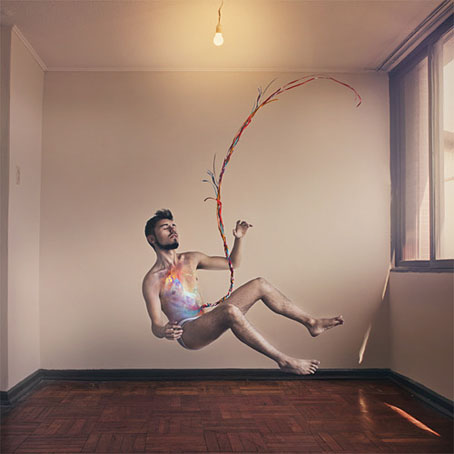Self-portrait by Jon Jacobsen from his Home series.
• Steven Arnold: Cabinet of Curiosities is “a retrospective exhibition of this groundbreaking yet under-recognized queer artist at the ONE Archives Gallery & Museum in West Hollywood. The exhibition celebrates Arnold’s radical imagination, presenting many of his tableaux vivant photographs alongside never before exhibited drawings, sketchbooks, paintings and original poster art. In conjunction with the exhibition, ONE will screen Arnold’s four films, including Luminous Procuress (1970), which featured The Cockettes and was lauded by Salvador Dalí.” The exhibition runs to January 12, 2013.
• “The boundary-pushing techno/sound design duo Emptyset will transform London’s cavernous industrial space Ambika P3 into an immersive sound installation for one night only—and here’s how they’re going to do it”.
• “At one time he was a well-known figure in Montparnasse, where he had a reputation as a master of the occult sciences.” Aleister Crowley is interviewed about his expulsion from France in 1929.
Our normal waking consciousness, rational consciousness as we call it, is but one special type of consciousness, whilst all about it, parted from it by the filmiest of screens, there lie potential forms of consciousness entirely different. We may go through life without suspecting their existence; but apply the requisite stimulus, and at a touch they are there in all their completeness… No account of the universe in its totality can be final which leaves these other forms of consciousness quite disregarded… [T]hey forbid our premature closing of accounts with reality.
William James (1842–1910) quoted in What Should We Do With Our Visions of Heaven—and Hell? by John Horgan at Scientific American.
• Screws is an album of piano music by Nils Frahm that’s currently available as a free download (inc. aiffs).
• At Pinterest: Art Visonnaire. Related: Ain’t We Got Fun: The magical surrealism of Jen Ray.
• Rowan Somerville “challenges the purpose and legitimacy” of the Bad Sex Awards.
• Jimmy’s End: the website for the film by Alan Moore & Mitch Jenkins.
• Douglas Rushkoff in conversation with Genesis Breyer P-Orridge.
• Linda Rodriguez McRobbie explores The History of Boredom.
• Recreating the sounds of the BBC Radiophonic Workshop.
• Alchemical Emblems, Occult Diagrams, and Memory Arts.
• Rocaille: A Blog about Decadence, Kitsch and Godliness.
• A new video for Goddess Eyes II by Julia Holter.
• The complete audio recordings of Jean Cocteau.
• The Rumpus interview with Russ Kick.
• RIP Spain Rodriguez
• Astradyne (1980) by Ultravox (produced by Conny Plank) | Biomutanten (1981) by Les Vampyrettes (Conny Plank & Holger Czukay) | Never Gonna Cry Again (1981) by Eurythmics (feat. Holger Czukay, produced by Conny Plank).


My first trip culminated with something akin to Horgan’s visionary experience, but I was (and am) quite sure this was influenced by my prior explorations of Gnosticism and Qabalah. I also didn’t find it particularly scary or terrible like he seemed to. A little sad in a Philip K. Dick way but also “right” and somewhat workable.
I liked his piece, it’s much better than the rabid, foaming at the mouth, responses toward Alexander elsewhere on the web. While Alexander’s experience and book could be used to further the wishy washy sentimental religion that humanity doesn’t need, it simply doesn’t do to deny the importance, even if it is solely personal, of visionary experiences throughout the ages. It denies the integral part that imagination, spirituality, and to a certain extent art have played in (some of) our lives. Which no one is really entitled to do…evangelism sucks both ways.
Oh, the Crowley interview was a real treat. It really does confirm what the contemporary opinion of him is said to have been by commentators and biographers.
I imagine the book in his room was Book 4 or one of the sections thereof.
Visionary/hallucinogenic experiences always make me think of dreams in that they’re essentially indescribable in ordinary human terms. If Aldous Huxley couldn’t do it beyond a certain point then few other people will manage any better. So the problem is that, as with dreams, what is experienced as profound comes across as banal or mundane in the recounting. This isn’t to dismiss them at all but it explains for me why post-visionary description often sounds unworthy of the claims being made for it.
I agree. “Proof of Heaven” is a hell of a claim to be making no matter what.
I always wondered why magicians didn’t write about their visions or, especially when I was starting out, their experiences on the astral plane. Later, after I had found and read a few I realized they’re occasionally just not that intelligible or entertaining unless it involves you or someone you know intimately. I guess that’s one of the reasons that the Moore’s are transforming theirs into a fictional narrative with “The Soul.”